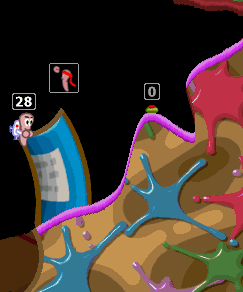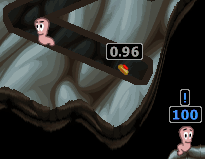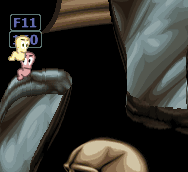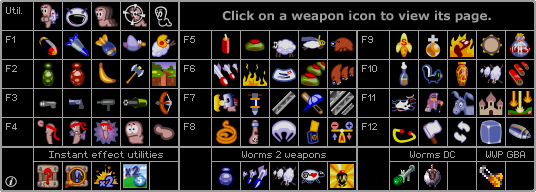Difference between revisions of "Mine"
From Worms Knowledge Base
(Mine hats tutorials by Dario on External links.) |
|||
| (49 intermediate revisions by 13 users not shown) | |||
| Line 1: | Line 1: | ||
| − | {{ParentArticle|[[ | + | {{ParentArticle|[[Weapons]]}} |
| − | {{Weapon|[[Image:Mineicon.png]]|Mine | + | {{Weapon|[[Image:Mineicon.png|40px]]|Mine |
|Drop and Run | |Drop and Run | ||
| − | |F5 (x2) | + | |F5 (x2)<br />{{i-wdc}} F7 (x3) |
| − | |50hp injury (max.), | + | |50hp injury (max.), Small circular crater |
| − | Small circular crater | + | |Worms, Worms DC, Worms 2, W:A, WWP}} |
| − | |Worms, | + | {{Power|15em}} |
| + | |- | ||
| + | !Power | ||
| + | !Maximum<br/>injury | ||
| + | !Crater<br/>diameter | ||
| + | |- | ||
| + | |11 | ||
| + | |25 hp | ||
| + | |47 px | ||
| + | |- | ||
| + | |12 | ||
| + | |35 | ||
| + | |73 | ||
| + | |- | ||
| + | |1 | ||
| + | |40 | ||
| + | |85 | ||
| + | |- | ||
| + | |2 | ||
| + | |45 | ||
| + | |85 | ||
| + | |- | ||
| + | |3 | ||
| + | |50 | ||
| + | |97 | ||
| + | |- | ||
| + | |4 | ||
| + | |55 | ||
| + | |111 | ||
| + | |- | ||
| + | |5 | ||
| + | |60 | ||
| + | |123 | ||
| + | |- | ||
| + | |19 | ||
| + | |65 | ||
| + | |123 | ||
| + | |- | ||
| + | |14 | ||
| + | |75 | ||
| + | |147 | ||
| + | |- | ||
| + | |15 | ||
| + | |100 | ||
| + | |199 | ||
| + | {{Power-end}} | ||
| − | Mines are incredibly common in the Worms games, largely due to the fact that they randomly appear on the landscape under certain [[Schemes|scheme]] settings, similar to [[Oil Drums]] | + | Mines are incredibly common in the Worms games, largely due to the fact that they randomly appear on the landscape under certain [[Schemes|scheme]] settings, similar to [[Oil Drum|Oil Drums]]. The way mines bounce is identical to a [[Grenade]] on the MAX bounce setting (bounces reduce the horizontal speed by 4% and the vertical speed by 40%). Mines are activated by having a worm come close to them; the detection range is a 45° tilted square with a radius (distance from center to vertex) of 48 pixels. Up to 50 HP of damage can be done to a worm by the mine. |
| − | Mines have | + | Mines that start on the landscape can have fuse lengths between 0 and 3 (random or fixed) and may occasionally be "dud" mines, that just give off harmless smoke rather than exploding, depending upon the scheme settings. The [[Updates (Worms Armageddon)|Worms Armageddon update v3.6.28.0]] allows fixed mine fuses from 0 to 127 to be selected, although a fuse length of 4 results in a random fuse. |
| − | + | Placing a mine will always give you a minimum of five seconds of retreat time, even if the scheme options are set to a lower value. | |
| − | + | In W2, WA and WWP, a mine placed by a player always has a fuse time of 3 seconds. These mines are useful for directly placing an explosive downwards that could explode in mid-air - especially from a [[Ninja Rope]], [[Bungee]], [[Parachute]], or [[Jet Pack]]. In [[Worms World Party]], mines placed by players have the same colour as the team that placed it, but they still function exactly the same. | |
| − | + | [[WormsDC]] can support a maximum number of 20 mines on screen at a time, including mines placed by the terrain generator. Dropping a 21st mine causes the game to crash. | |
| − | == | + | === Dud Mines === |
| + | The probability for a mine being a dud works in a similar way to how [[Crate Probability]] works. There is an array of 6 entries that holds values representing "normal mine" and "dud mine". When a mine is triggered, one of these values is chosen then deleted from the array. When the array is emptied, it is reset. This information allows a player to know that the odds of a mine being dud increases as mines are detonated. | ||
| − | + | A mine only has the possibility of becoming a dud if it has a worm target within a certain range at the moment of would-be detonation (not the same range as mine triggering range). If the first 5 mines in a game are not duds and have a worm target within range, then the sixth mine to detonate is guaranteed to be a dud (assuming it also has a target within range). There can never be more than 10 non-dud mines in a row (assuming they all have a target in range, and none in-between don't). | |
| − | + | ||
| − | + | ||
| − | + | ||
| − | + | ||
| − | + | ||
| − | + | ||
| − | + | ||
| − | + | ||
| − | + | ||
| − | + | ||
| − | + | ||
| − | + | ||
| − | + | Dud mines can be detonated in Worms World Party and versions of Worms Armageddon before the 3.6.21.1 Beta update. See [[Dud mine explosion]] for more details. | |
| − | + | == Tactics == | |
| − | + | [[Image:Punching instant mine.gif|thumb|right|At the edge with sufficient speed, an instant mine can be punched to an enemy]] | |
| − | * Mines can be dropped off of the edges of cliffs onto worms below more accurately than a grenade can, provided the enemy worm is | + | * Mines have the tactical advantage of being able to be pushed around the landscape by the force of explosions given off by weapons, meaning that they can be moved around the landscape into other worms to some degree. The mines get thrown around by the explosions to a larger extent than a worm, and combined with the high, erratic bouncing, they can become quite unpredictable when trying to move them across the landscape. |
| + | * Many players try to knock worms into mines, causing more damage to the worm during their turn. Sometimes, mines may be knocked into the worms, but this is usually harder to achieve accurately. Low force weapons such as a few shots with the [[Handgun]] or a single [[Shotgun]] bullet can be used to move the mines around carefully. Of course, this depends upon the movement options and utilities that the other players have access to. The term ''mineipulation'' was coined by Vader, and means to directly hit mines in to other worms. | ||
| + | [[Image:tactical thin layer mine.png|left|thumb|Activating a mine dropped on the previous turn to open a path for an attack (the enemy couldn't get close enough to activate it)]] | ||
| + | [[Image:Jump mine knock Alt-F4.gif|thumb|right|Killing a worm using a jump mine knock]] | ||
| + | * After creating a tunnel with the [[Blowtorch]], a small thin layer of land can be left at the end of the tunnel if the player can't dig far enough or turns off the Blowtorch before completely digging through it. By placing a mine at the end of this tunnel, the worm can trigger it during their next turn, allowing them to pass through the barrier and still be able to fire a weapon that turn, which is useful if an enemy worm is on the other side. | ||
| + | * When a mine is placed on an worm's head it will cause the worm to fly upwards rather than downwards. Skilled players can use this fact to move enemy worms over obstacles and into a less advantageous position. | ||
| + | * Mines can be dropped off of the edges of cliffs onto worms below more accurately than a grenade can, provided the enemy worm is directly below the cliff edge. | ||
* Mines naturally have a tendency to fall into dips and craters in the landscape, so worms stuck inside holes can easily be hit by stray mines bouncing around. | * Mines naturally have a tendency to fall into dips and craters in the landscape, so worms stuck inside holes can easily be hit by stray mines bouncing around. | ||
| − | + | * Mines can be pushed by worms jumping into them, or by having worms on [[Jet Pack|Jet Packs]] slide into them, although both of these cases are only possible when the landscape is the correct shape. | |
| − | * Mines can be pushed by worms jumping into them, or by having worms on [[ | + | * When a mine is hit by a [[Longbow]] arrow, it is catapulted in the opposite direction at high speed, usually at the same angle that the arrow came in on, if it was fired from higher ground. |
| + | * If used with sufficient speed hitting the edge of a mine, [[Fire Punch]] can throw it far away without triggering it, being possible to blast an enemy with an instant mine. See [[Erratic proximity polling by a mobile Mine]]. | ||
| + | |||
| + | == Disadvantages == | ||
| + | * [[Grenade]]s shot directly downwards does the same damage as dropping a mine directly on top of the enemy worm and are usually in more plentiful supply, making them fairly redundant for dealing close range damage. However the Grenade will not cause the enemy to fly upwards, limiting its potential to move the enemy worm elsewhere. | ||
| + | * The 3 second fuse time reduces their ability to block off certain areas, as the opponent can usually trigger the mine and escape before they detonate. This makes placing your own mines useless as a defensive tool, despite the design of the weapon suggesting otherwise. | ||
| − | == | + | == External links == |
| + | {{Wormopedia}} | ||
| + | * [https://youtu.be/cjM0_aUF5B0 Mine Hats (basic) tutorial video] by [[People/Dario|Dario]] | ||
| + | * [https://youtu.be/E-u2QJ_62Sw Mine Hats (Low Gravity) tutorial video] by Dario | ||
| + | * [https://youtu.be/taPR_JzX6sk Advanced Mine Hats tutorial video] by Dario | ||
| − | + | {{weapons}} | |
Latest revision as of 23:33, 5 September 2022
| | |
|---|---|
| Type: | Drop and Run |
| Keyboard selection: | F5 (x2) |
| Standard effects: | 50hp injury (max.), Small circular crater |
| Present in: | Worms, Worms DC, Worms 2, W:A, WWP |
|
Mines are incredibly common in the Worms games, largely due to the fact that they randomly appear on the landscape under certain scheme settings, similar to Oil Drums. The way mines bounce is identical to a Grenade on the MAX bounce setting (bounces reduce the horizontal speed by 4% and the vertical speed by 40%). Mines are activated by having a worm come close to them; the detection range is a 45° tilted square with a radius (distance from center to vertex) of 48 pixels. Up to 50 HP of damage can be done to a worm by the mine.
Mines that start on the landscape can have fuse lengths between 0 and 3 (random or fixed) and may occasionally be "dud" mines, that just give off harmless smoke rather than exploding, depending upon the scheme settings. The Worms Armageddon update v3.6.28.0 allows fixed mine fuses from 0 to 127 to be selected, although a fuse length of 4 results in a random fuse.
Placing a mine will always give you a minimum of five seconds of retreat time, even if the scheme options are set to a lower value.
In W2, WA and WWP, a mine placed by a player always has a fuse time of 3 seconds. These mines are useful for directly placing an explosive downwards that could explode in mid-air - especially from a Ninja Rope, Bungee, Parachute, or Jet Pack. In Worms World Party, mines placed by players have the same colour as the team that placed it, but they still function exactly the same.
WormsDC can support a maximum number of 20 mines on screen at a time, including mines placed by the terrain generator. Dropping a 21st mine causes the game to crash.
Contents
[hide]Dud Mines
The probability for a mine being a dud works in a similar way to how Crate Probability works. There is an array of 6 entries that holds values representing "normal mine" and "dud mine". When a mine is triggered, one of these values is chosen then deleted from the array. When the array is emptied, it is reset. This information allows a player to know that the odds of a mine being dud increases as mines are detonated.
A mine only has the possibility of becoming a dud if it has a worm target within a certain range at the moment of would-be detonation (not the same range as mine triggering range). If the first 5 mines in a game are not duds and have a worm target within range, then the sixth mine to detonate is guaranteed to be a dud (assuming it also has a target within range). There can never be more than 10 non-dud mines in a row (assuming they all have a target in range, and none in-between don't).
Dud mines can be detonated in Worms World Party and versions of Worms Armageddon before the 3.6.21.1 Beta update. See Dud mine explosion for more details.
Tactics
- Mines have the tactical advantage of being able to be pushed around the landscape by the force of explosions given off by weapons, meaning that they can be moved around the landscape into other worms to some degree. The mines get thrown around by the explosions to a larger extent than a worm, and combined with the high, erratic bouncing, they can become quite unpredictable when trying to move them across the landscape.
- Many players try to knock worms into mines, causing more damage to the worm during their turn. Sometimes, mines may be knocked into the worms, but this is usually harder to achieve accurately. Low force weapons such as a few shots with the Handgun or a single Shotgun bullet can be used to move the mines around carefully. Of course, this depends upon the movement options and utilities that the other players have access to. The term mineipulation was coined by Vader, and means to directly hit mines in to other worms.
- After creating a tunnel with the Blowtorch, a small thin layer of land can be left at the end of the tunnel if the player can't dig far enough or turns off the Blowtorch before completely digging through it. By placing a mine at the end of this tunnel, the worm can trigger it during their next turn, allowing them to pass through the barrier and still be able to fire a weapon that turn, which is useful if an enemy worm is on the other side.
- When a mine is placed on an worm's head it will cause the worm to fly upwards rather than downwards. Skilled players can use this fact to move enemy worms over obstacles and into a less advantageous position.
- Mines can be dropped off of the edges of cliffs onto worms below more accurately than a grenade can, provided the enemy worm is directly below the cliff edge.
- Mines naturally have a tendency to fall into dips and craters in the landscape, so worms stuck inside holes can easily be hit by stray mines bouncing around.
- Mines can be pushed by worms jumping into them, or by having worms on Jet Packs slide into them, although both of these cases are only possible when the landscape is the correct shape.
- When a mine is hit by a Longbow arrow, it is catapulted in the opposite direction at high speed, usually at the same angle that the arrow came in on, if it was fired from higher ground.
- If used with sufficient speed hitting the edge of a mine, Fire Punch can throw it far away without triggering it, being possible to blast an enemy with an instant mine. See Erratic proximity polling by a mobile Mine.
Disadvantages
- Grenades shot directly downwards does the same damage as dropping a mine directly on top of the enemy worm and are usually in more plentiful supply, making them fairly redundant for dealing close range damage. However the Grenade will not cause the enemy to fly upwards, limiting its potential to move the enemy worm elsewhere.
- The 3 second fuse time reduces their ability to block off certain areas, as the opponent can usually trigger the mine and escape before they detonate. This makes placing your own mines useless as a defensive tool, despite the design of the weapon suggesting otherwise.



